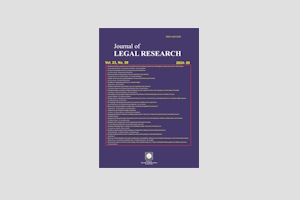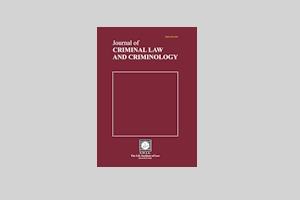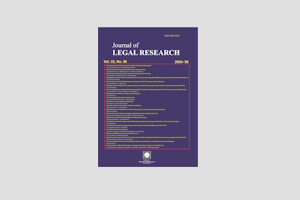Journal of
PRIVATE LAW
Number5
Vol. 3 ● No. 5
September 2015
Managing Editor: Vahid Eshtiagh
Editor-in-Chief: Seyyed Ghasem Zamani
CONTENTS
The Legal basics of farm Nsq in Iranian law
Morteza Youssefzadeh; Majid Khalilpour Gorgani
The Liability of Parent Company against the Debt of its Insolvent Subsidiaries
Korosh Kaviani; Saide Ghasemi Moghaddam
Annulment of Trademark and Unregisterability of Trademarks Due to Lack of Differentiating Features
Sogol Fazel Motlagh
Comparative Study of Theory Autonomy Principle Baking Letters of Credits in International and Iran law
Saeed Chaharbaghy
Partial Performance of Contractual Obligations Subtitle: Comparative Study of Contractual Liability under Iranian and English Legal Systems
Ali Shahabi
The Effects of Contract Abstraction in Iranian Law
Habiballah Rahimi; Zohre Karimi
The Legal basics of farm Nsq in Iranian law
Morteza Youssefzadeh
Majid Khalilpour Gorgani
Abstract
In former villeinage system, the agricultural lands most belonged to grand landowners, known as lords. But actually the peasant villagers were farming in such lands. Although there wasn’t a precisely clear legal relationship between the lord and the peasant villagers, in most cases it was mainly described as farms and renting. Mainly due to such a relationship and the continuous endeavor of the farmers in such lands, a right has emerged known as Āb-o-Gel or Nasaq (inevitable) right in different areas involved. By virtue of such a right, the peasant villager will be given a priority on the land farming, in a way the owner couldn’t seize the land to have it grown by others. After the death of the farmer, such a right was transformed to his heirs. When the government has strongly determined to eradicate such an old system and implement new laws mainly land reforms since 1341, such a right, farm Nsq, was considered as legal with an official document giving the peasant farmers a right to have the lands on their own afterwards. Having implemented such land reforms, the concept of ownership is understood.
Keywords
farm Nsq Farmer owner land reforms renting
The Liability of Parent Company against the Debt of its Insolvent Subsidiaries
Korosh Kaviani
Saide Ghasemi Moghaddam
Abstract
Nowadays, most of commercial activities have been done through the Group Companies’ structure. The Insolvency of these Group Companies is a rather complicated subject which is derived from its feature as a “Group”. The feature of acting as a Group may result in contrast between two realities: Legal and Economic. The Legal reality is that a group is comprised of some independent companies and each of them has a separate personality from the other and they are incorporated under different legal systems. Due to the principle of Sovereignty, the Insolvency procedure is preceded independently from the other procedures and the Parent company, as the main shareholder, has a limited liability against the debt of its subsidiary. However, the Economic reality is related to the operation of these companies which most of time they act as a unified and integrated group and the Parent company apply its control and management on them and it shall be deemed responsible as to the debt of subsidiary. By contrast of these two realities, two approaches have been emerged concerning the Group Companies. The approach of Entity Principle is based on legal reality and the main attention of Enterprise Principle is on the group’s operations.
This article was an attempt to consider mentioned realities and approaches results from the contrast of these two realities in order to make a balance between them.
Keywords
Group Company Parent Company Subsidiary Enterprise Principle Entity Principle
Annulment of Trademark and Unregisterability of Trademarks Due to Lack of Differentiating Features
Sogol Fazel Motlagh
Abstract
Today, the dominant atmosphere of market is filled with competition, especially in marketing and attracting customers. This overgrowing competition leave the main actors of the market who are goods and service producers with a significant concern, how to assure the consumer of the originality of the product and how to indicate the information of the producer and whether they have exclusive right over this indicator. Indeed Intellectual property law serves producers with trade mark law. However not every trade mark is to be protected by this lawful regime but only those trademarks deserve monopolization which are distinctive and are capable to differentiate between the goods and services of the stakeholders.
Keywords
Trademark Registerability Substantial provisions for registration Differentiating feature Assessment of distinctiveness Annulment
Comparative Study of Theory Autonomy Principle Baking Letters of Credits in International and Iran law
Saeed Chaharbaghy
Abstract
Autonomy principle call as one of the basis and common doctrine in letters of credit and bank Guarantee which most importance of its influence is inattention for basic contract objections toward credits .in this research moreover introduction of this principle from govern international rules and also internal and external doctrine, compare this principle in both legal institutions until first, specify unity and segregation mood and also problems and doubts that exist in recognition of this principle in each of these institution and secondly, with representation of legal analysis try to modify this principle equal with Iran legal systems .in this row with design of basic autonomy principle in letters of credit with inspiration from 600 UCP rules with principle relation to autonomy legal letters of credit nature and also with other independent contract pillars specially object and also both parties of independent contract with notice to contract privacy of contract.
Principle (231 article of civil law), its found its basic indigenous but there are more doubt abut autonomy bank Guarantee(An demand) which impute to analytic objection from letters of credits, base on common intention and assignment of debt; and at the final, result of discussion suggest in two article of law form.
Keywords
Autonomy principle inattention to objection basic contracts letters of credits on demand guarantee
Partial Performance of Contractual Obligations Subtitle: Comparative Study of Contractual Liability under Iranian and English Legal Systems
Ali Shahabi
Abstract
Breaching a contractual obligation would result in consequences which are known as “Civil Liability”. Under Iran’s legal system, the rule in such cases is “Specific Performance” of the obligation, which in case of not being possible entitles the covenantee for “Rescission” of the contract and claiming “Damages”. While, in England Damages is the rule which in case of not being sufficient may give rise in Specific Performance or other Remedies. “Partial Performance of an Obligation” is absolutely included in Civil Liability System (however such issue has not been cited within the scripts) and may bring same consequences, indeed with a comment that all the ramifications of breach of contract might be put under the umbrella of “not performing the contract at all”, varied ramifications that have minor diversities in terms of legal consequences.
Keywords
Breach partial performance remedy
The Effects of Contract Abstraction in Iranian Law
Habiballah Rahimi
Zohre Karimi
Abstract
Continuance and performance of a contract is important in Iranian law and legislator has emphasized it in several cases. Entire performance is the aim and interest of concluding a contract. In condition that complete performance of a contract is not possible at any reason and breach occur in the part of it, the necessity of severance of a contract come into existence. Applicable principals prevent termination whole of the contract for a partial breach, thus while an abstraction is created on the way of accomplishment of the principle of entire performance, partial performance of a contract is better than letting loose and giving up of a whole. This rule results from principal of severability of a contract that cause any part of a contract that have been enforced, being correct and have lawful effects between contractual parties.
Keywords
severance of contract installment of Consideration right of cancellation extinction of obligation





